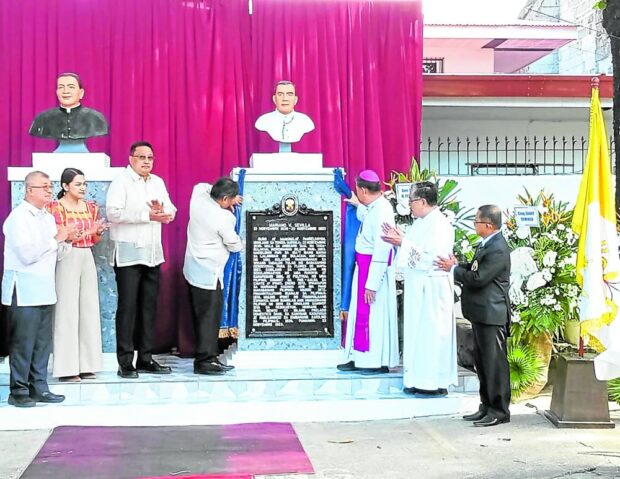
THE BUST | Government and church officials led by National Historical Commission of the Philippines Director Emmanuel Calairo and Malolos Bishop Dennis Villarojo unveil the marker of the bust of Padre Mariano Sevilla at the grounds of Nuestra Senora de la Asuncion parish in Bulakan, Bulacan on Thursday during the priest’s 100th year death anniversary. (Photo by CARMELA REYES-ESTROPE / Inquirer Central Luzon)
BULAKAN, Bulacan, Philippines — The National Historical Commission of the Philippines (NHCP) led Bulacan officials in honoring the centennial death of nationalist and poet Fr. Mariano Sevilla who fought for the secularization of Filipino priests during the Philippine-Spanish Revolution and initiated the “Flores de Mayo” Roman Catholic tradition over a hundred years ago.
NHCP director Emmanuel Calairo was joined on Thursday by Malolos bishop Dennis Villarojo, Nuestra Señora de la Asuncion parish priest Fr. Joaquin Javier, Bulakan Mayor Vergel Meneses and other local leaders in unveiling the marker on the bust of Sevilla at the grounds of the Nuestra Señora de la Asuncion parish church here.
The Malolos Diocese recognized Sevilla for leading the secularization of the Filipino priests during the Philippine-Spanish Revolution and for his written translation of the “Flores de Mayo” (flowers of May), also known as “Flores de Maria,” a collection of poems and songs in honor of the Blessed Virgin Mary.
The marker read: “Teacher, religious writer, born in Tondo, Manila on Nov. 12, 1839, from a clan in Bulakan.” Sevilla died on Nov. 23, 1923.
Sevilla was ordained priest in 1863, was implicated in a revolt in Cavite, and was incarcerated in January 1872.
He was “exiled in Marianas Island together with other nationalist and Filipino revolutionaries also in 1872. He was allowed to return to the country in March 1874. He was again placed in jail by the Spanish leaders during the Philippine Revolution in 1896 on suspicion of his involvement in the revolution. He was installed by Pope Benedict XV as ‘Perlado Domestico’ because of his faithfulness and loyalty to the Roman Catholic Church,” his bust’s marker read.
Tradition
Due to his translation of the devotion to the Virgin Mary, the “Flores de Mayo” became a tradition that continues to be practiced today every month of May. Catholics across the country would dress their chosen representatives to represent the characters in the search for the Holy Cross at the “Santa Cruzan,” a ritual pageant.
The Nuestra Señora de la Asuncion parish and the Knights of Columbus funded the bust and the marker with the support of Kabesera Inc., the cultural and historical group of Bulakan and the municipality of Bulakan, according to Santos.
Dela Peña said the bust of Sevilla and that of another prominent Bulakan priest Fr. Mariano Pilapil, who wrote the “Passion of Christ” (Pasyong Mahal), also known as “Pasyong Pilapil” that are read and sung during Holy Week, are now put together in an ideal new site in the Nuestra Señora de la Asuncion parish grounds to make them both visible to residents.